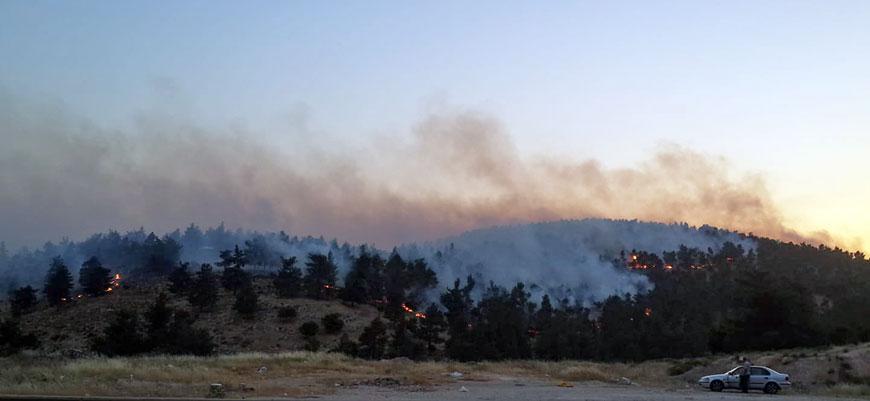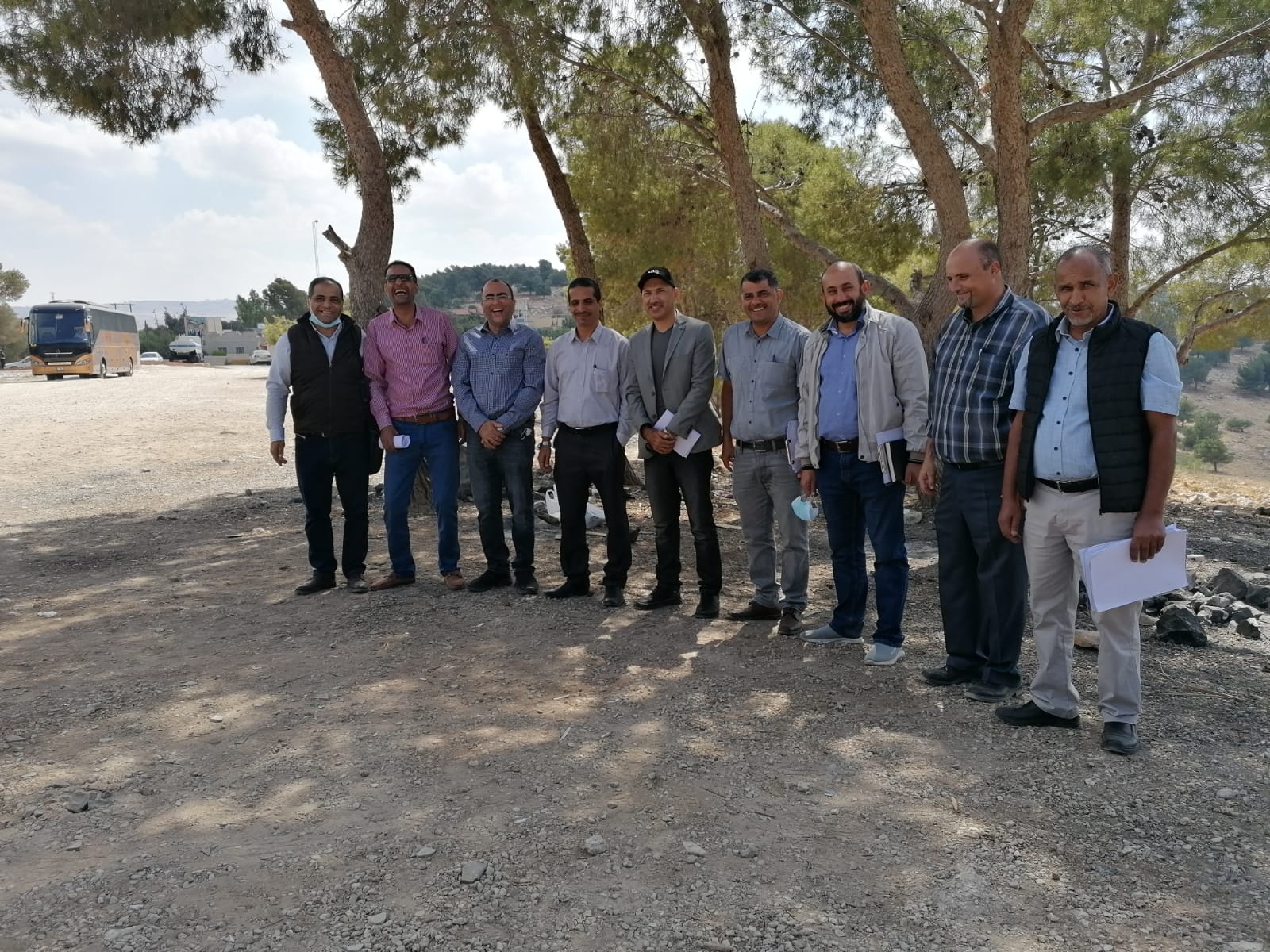
Advancing fire management: a new approach in Jordan’s forests
Massive wildfire erupts in Jerash’s Thaghret Asfour. (Photo by Mohammad Dweiri)
The Jordan Times
02/09/2024
The burning issue
Jordan's forests, spanning around 87 000 ha with an additional 2 405 km of roadside plantations, are crucial for biodiversity and ecological stability but face severe threats from increasing wildfires fueled by climate change and human activities. Rising temperatures and prolonged dry spells have turned these forests into tinderboxes, threatening the environment and the livelihoods of dependent communities. Despite covering less than one percent of the country's land area, these fragmented forests suffer from limited natural regeneration. The integration of cultivated agricultural fields complicates efforts to control grazing, tree cutting, and encroachment. By 2021, traditional fire management methods proved inadequate against the growing fire threat.
A collaborative strategy
In response to this urgent need, FAO partnered with the Jordanian Ministry of Agriculture (MoA) to launch the transformative project “Enhancing the Capacity of the Forestry Sector to Control and Manage Forest Fires in Jordan.” Funded by FAO with a budget of USD 99 620 and running from October 2021 to December 2023, this initiative aimed to revolutionize forest fire prevention and management practices in Jordan.
Path to progress: defining clear goals for sustainable forest management
The project's overarching objective was to strengthen the sector's capacity and contribute to national development by ensuring the sustainable management of Jordan's forest resources. This goal encompassed biodiversity conservation, poverty reduction, food security, and mitigating the impacts of climate change. The project aimed to achieve this through three primary outputs: enhancing community engagement, improving national competence, and updating governance and law enforcement.
.jpeg?sfvrsn=fff9fb98_5)
.jpeg?sfvrsn=c38dcbfd_5)
The utilizing of GIS for improving wildfire prevention, early detection, control and documentation (field day) © FAOJordan
Building capacity and enhancing governance
The project developed two specialized programmes to address training gaps, equipping Forestry Directorate and Ministry of Agriculture (MoA) staff with modern skills. An early warning system for fires was established, integrating risk assessment, monitoring, response, and communication strategies. Modern technologies, including digital reporting templates and tablets for rangers, improved data collection and response efficiency.
Legislative frameworks were updated for better fire management, enhancing coordination among relevant institutions. The exploration of traditional governance modalities, like the HIMA system[1], offered insights into sustainable land management practices.
A FAO-led workshop on Geographic Information Systems (GIS) for fire management equipped Ministry of Agriculture and Forestry Department experts with GIS tools for fire prevention, early detection, and control. Additionally, FAO and the Royal Scientific Society (RSS) signed an agreement to support community-based fire management, including awareness campaigns and traditional governance models.
Minister of Agriculture Khalid Hneifat highlighted the project's importance, stating, “The development and protection of Jordan's forests are crucial, especially given that our forest cover represents less than one percent of the country’s total area. This project is a vital step in enhancing our forest management capabilities and ensuring sustainable use of our natural resources.”
Empowering communities and enhancing engagement
The project profoundly enhanced Jordan's wildfire management by actively involving three communities and civil societies. Enthusiastic participation in awareness campaigns reflected strong commitment to forest conservation. Community-based initiatives were developed, showcasing proactive engagement and collaboration.
Building national capacity and strengthening governance
The project significantly bolstered national expertise and infrastructure through two specialized capacity-building programmes that addressed critical training gaps. Thirty-five employees participated in eight workshops, enhancing their fire management skills. Modern technologies were integrated into fire management practices, with rangers trained on digital tools to improve data collection and response efficiency. Governance and law enforcement were also strengthened through three key measures developed from extensive workshops and stakeholder consultations, improving coordination among institutions responsible for fire management. An effective early warning system was established, incorporating risk knowledge, monitoring, response capabilities, and communication.

© FAOJordan
Demonstrating impact and progress
The project achieved all its targets, directly benefiting 120 community members and employees, and engaged 85 stakeholders over its lifespan, ensuring comprehensive participation. From 2016 to 2020, Jordan experienced 342 forest fires, impacting a total of 1136.75 ha. In the following period, from 2021 to 2023, the total impacted area was reduced to 541.97 ha.
Despite initial challenges in 2021 and 2022 when increased temperatures and prolonged dry spells caused an exceptionally high number of fires, data from 2023 shows a significant decrease in both the number of fires and the impacted area, with only 78.7 ha affected. This trend suggests that the project's strategies and community involvement are beginning to have a positive impact. The downward trend in 2023 indicates that Jordan is on track to achieve its goal of a 10 percent reduction in the area burned by fires for 2021-2025. Continued efforts throughout 2023 and 2024 will be essential to sustaining this progress and meeting the project's long-term objectives.
A flame of transformation: regional framework on wildfire management
In addition to national efforts, regional initiatives have been pivotal in advancing wildfire management. FAO supports countries in the NENA region through collaborative networks such as the NENFIRE network, which provides a platform for sharing best practices, tools, and strategies for wildfire prevention and management. This network facilitates regional cooperation and helps countries like Jordan strengthen their forest management capabilities. Reports like FAO's Forests, Rangelands, and Climate Change in Jordan demonstrate the importance of integrating local actions with regional frameworks to enhance overall effectiveness in managing wildfires and building climate resilience.
